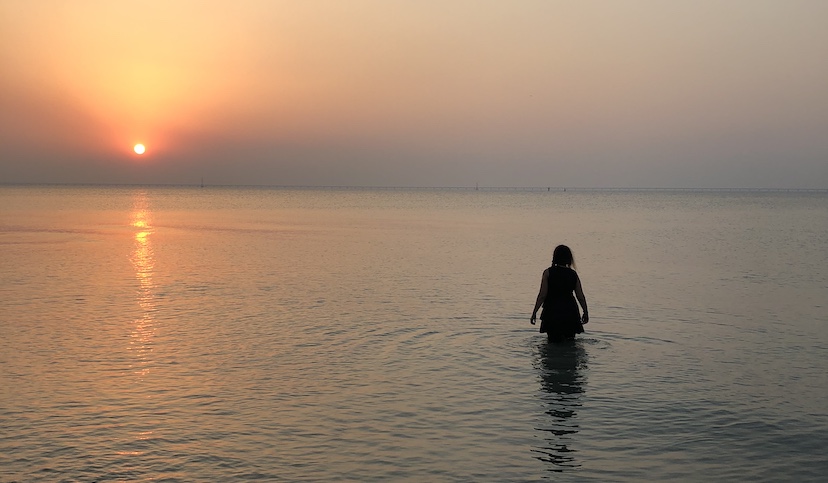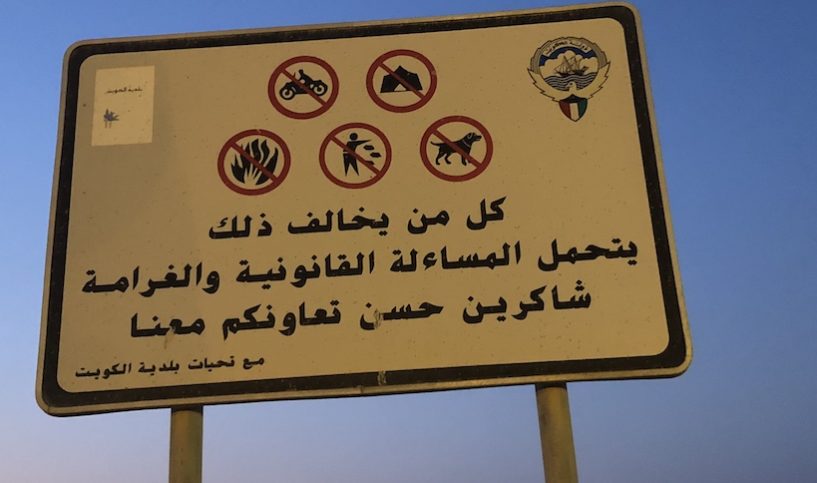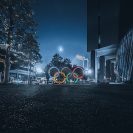Driving along the Arabian Gulf road, the sweep of the sparkling, blue waters is a constant reminder that Kuwait is geographically blessed with proximity to the sea. But the long coastline is underutilized by the public. Why are the city beaches not full of bathers as in other cities with a similar setting?
Alec Gribble, long term resident of Kuwait and a supplier of stand up paddle boards from the Red Paddle Company says water quality concerns and access are the two main problems. “Most people are not sure which beaches are public. They don’t realize that almost all the beaches apart from the hotels and one or two special zones are all public,“ he says.
Alec who regularly enjoyed the sea during his time in Kuwait in the early 90s was surprised to find on his return in 2007 that many beaches he used to frequent were now inaccessible to the public. The coast towards the south has been built up with private chalets and gates now block access to the alleyways that lead to the beaches. By introducing stand up paddle boarding in Kuwait he has helped many people enjoy the water again.
Despite increasing access issues there are still a number of beaches dotted along the coastline that can be reached including the well-known city beaches in Marina Crescent, Blajat, Messila and Anjafa and smaller beaches further south to Abou al Hasaniya. But how safe are they to swim in?
Dr. Talat Saeed from the Kuwait Institute of Scientific Research (KISR), who has conducted studies on sewage pollution in Kuwait waters, feels the media sensationalizes the water quality concerns.
His message is upbeat. “Public beaches in Kuwait Bay (from Salmiya to Shuwaikh) are not bad. The beaches south of Salimya are better. Probably the best water quality is along the beaches further south (Ras Juleah to Alzoor),” he says. “Relatively, Kuwait seawater is of reasonable quality. The situation is not ideal but for sure it is not as bad and all of us can do something about it.”
According to Dr. Saeed the water quality in Kuwait is better than 15 years ago after the construction of Sulaibiya water treatment plant that treats domestic wastewater using the reverse osmosis (RO) technique. The reclaimed water is used for agricultural and industrial applications, gardening and for washing cars and buildings.
“Now there is enough capacity to treat all of the sewage,” Dr. Saeed says. Even though it is not uncommon to see families wading in the waters near Shuwaikh beach Dr. Saeed says it is probably not the best for swimming because of its proximity to the port, the chlorine plant and the Ghazali drain. His advice to beachgoers: “Some common sense tips. Before going into the water, look around. If there is active storm drain (discharging sewage) stay away.”
Messila residents have reported foul smell coming off the storm water drains most afternoons and say they can sometimes see the sewage being pumped out. They get around this by swimming in high tide when the water is coming in or 100 to 200 meters from the shore.
Aside from water quality concerns, a walk on the public beaches of Kuwait is a harsh reminder of the litter problem. In some cases it is just ugly – cigarette butts, soggy bread and plastic bags and bottles discarded by fishermen and picnickers. In other cases more dangerous litter like broken glass and syringes have been spotted.
A resident of Abu Al Hasaniya who requested to remain anonymous says they recently gated their beach front property because the increase in the number of people using the beach in the last year has resulted in many problem for residents – noise, trash, buggies on the beach and in one instant a harpoon gun.
“It has always been a public beach and in the past people have respected it. I feel that now there is a lack of respect for the neighbors, for the environment, for the place itself. “ she says. “In a place like Kuwait you need to have very strict rules and you need to impose them.”

Environmental activist, campaigner and kayaker Bashar AlHuneidi, founder of Kayak4Kuwait who uses the sport to raise environmental awareness says until there is a change in such damaging behavior it is better that the beaches are underutilized.
“Definitely they could be much better utilized but along with this I think there needs to be a proper plan to make them beautiful and to keep them beautiful,” he says.
Arabic signs along some of the city beaches mention penalties for littering and ask residents to respect the shared bounty of the coast. But there is no evidence of active enforcement and no English language signs for non-Arabic speakers.
But things may be changing. The EPA introduced a comprehensive Environmental Protection Law in 2014, which includes protection of the marine environment.
“We need this law because we still have complete disregard for the environment. But it needs people to enforce it and a serious financial commitment from the government,” Bashar says. ”We see the message is getting out there, and people are more aware of it. I think with more enforcement we can remove some of the main issues.”
He feels that beach clean ups alone will not change things but a change of behavior movement is what is required. “I have hope for the personal littering part because it is something you can change in an instant – you decide not to throw,” he says.
A sign that things might be improving is that, in this recent summer, Kuwait did not have a red tide – the harmful algai bloom that is exacerbated by the pollution in the water and causes fish kills. Other citizen eco warriors and groups have been emerging in the last year carrying out beach clean ups and raising environmental awareness.
As the number of people using the beaches increases, one can hope that a change in behavior of both public and industry will result in more trust between beach residents and visitors alike to open up the beaches for more people to use, and to maintain a healthier water and marine environment.
“When there is a better quality of outside space people naturally get attracted to it,” says Alec from Red Paddle Q8 “Although I love the solitude of being on the water early in the morning, it is really good to see more people out on their boards paddling, sailing or kayaking, especially in the weekends”
For more information on Bashar Alhuneidi and Alec Gribble please follow their respective accounts @kayak4Kuwait and @redpaddlecoq8 on Instagram.
Images courtesy of Reem Al-Gharabally.








